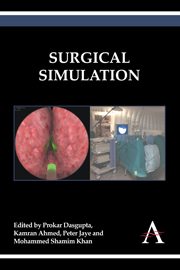Book contents
- Frontmatter
- Contents
- 1 Surgical Simulation: An Overview
- 2 Simulation in Historical Perspective: The History of Medical and Surgical Simulation
- 3 The Role of Animal Models in Surgical Training and Assessment
- 4 Full Procedural Surgical Simulation
- 5 Developing Non-technical Skills
- 6 Learning Curves for Simulators
- 7 Developing a Simulation Programme
- 8 Patient Safety and Simulation
- 9 Psychometrics
- 10 Future of Surgical Simulation
- Author Details
1 - Surgical Simulation: An Overview
Published online by Cambridge University Press: 05 April 2014
- Frontmatter
- Contents
- 1 Surgical Simulation: An Overview
- 2 Simulation in Historical Perspective: The History of Medical and Surgical Simulation
- 3 The Role of Animal Models in Surgical Training and Assessment
- 4 Full Procedural Surgical Simulation
- 5 Developing Non-technical Skills
- 6 Learning Curves for Simulators
- 7 Developing a Simulation Programme
- 8 Patient Safety and Simulation
- 9 Psychometrics
- 10 Future of Surgical Simulation
- Author Details
Summary
Simulation-Based Surgical Training
Definitions
Assessment – a process of documenting an individual's knowledge, skills and attitudes or beliefs on a given topic or content
Certification – confirming a specific or pre-determined level of knowledge, skills or attitudes through a formal assessment process
Credentialing – an objective process of establishing the qualifications of individuals or organisations through a formal assessment or evaluative process
Curriculum – any planned educational experience that involves goals, objectives, teaching methods and assessment or evaluation of individuals
Simulation – a person, device, or set of conditions that attempts to imitate a real environment
Virtual reality – a computer-based simulation of a real environment that allows for immersive interaction
As a result of advancements in science and technology, the field of surgery has witnessed significant changes and growth over the past few decades. The introduction of new surgical technologies has also been accompanied by more challenging surgical procedures for a more complex patient population. In addition, factors such as legislated limitations on resident work hours, an increased emphasis on safety and patient-centred care and increasing pressures to utilise costly operating room (OR) resources more efficiently have mandated significant changes to surgical training curricula.
The traditional residency training paradigm established by Dr William Halsted placed a strong emphasis on structured apprenticeships, with trainees developing surgical expertise in a supervised clinical setting over a prolonged training period consisting of increasing levels of responsibility (1).
- Type
- Chapter
- Information
- Surgical Simulation , pp. 1 - 14Publisher: Anthem PressPrint publication year: 2014



